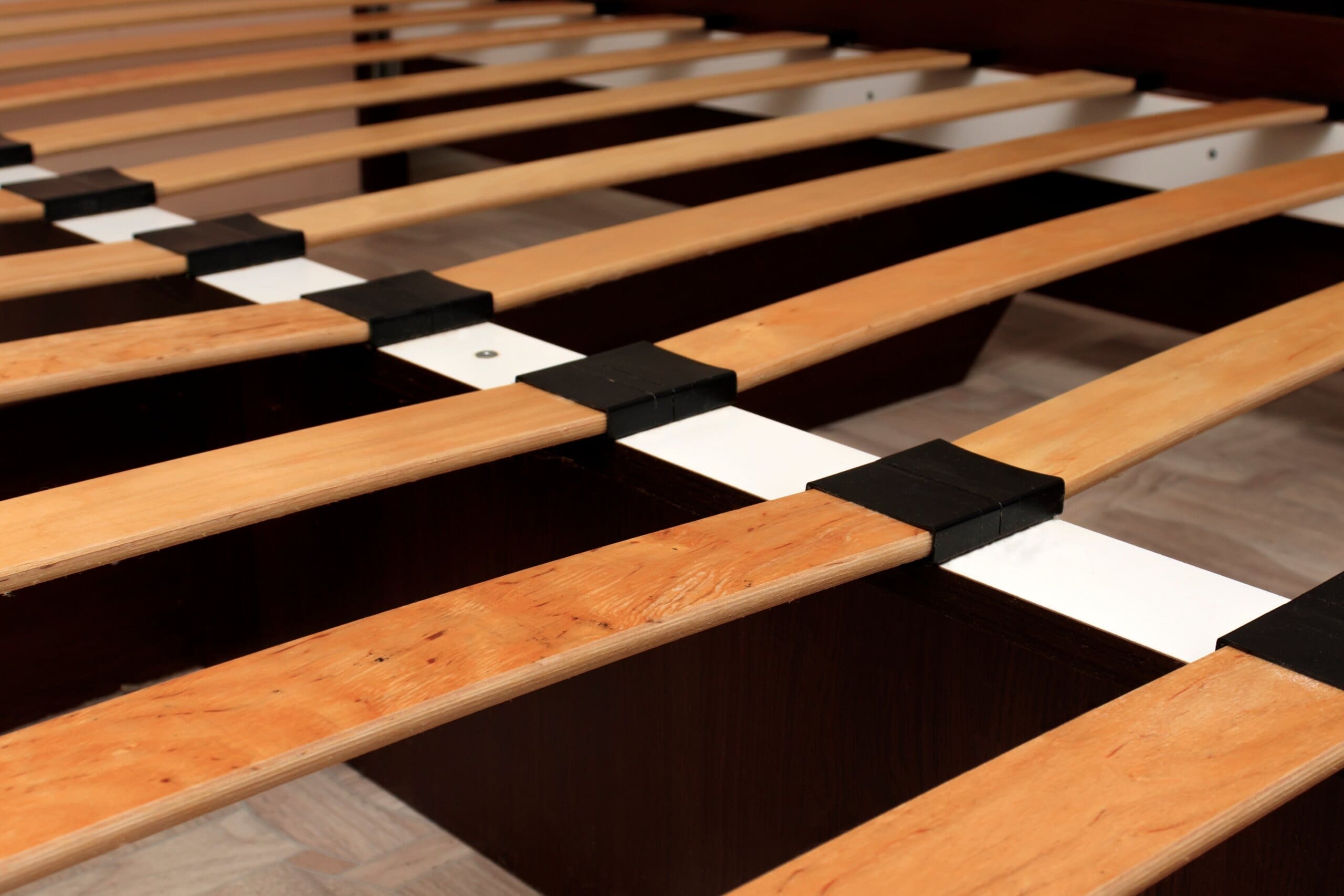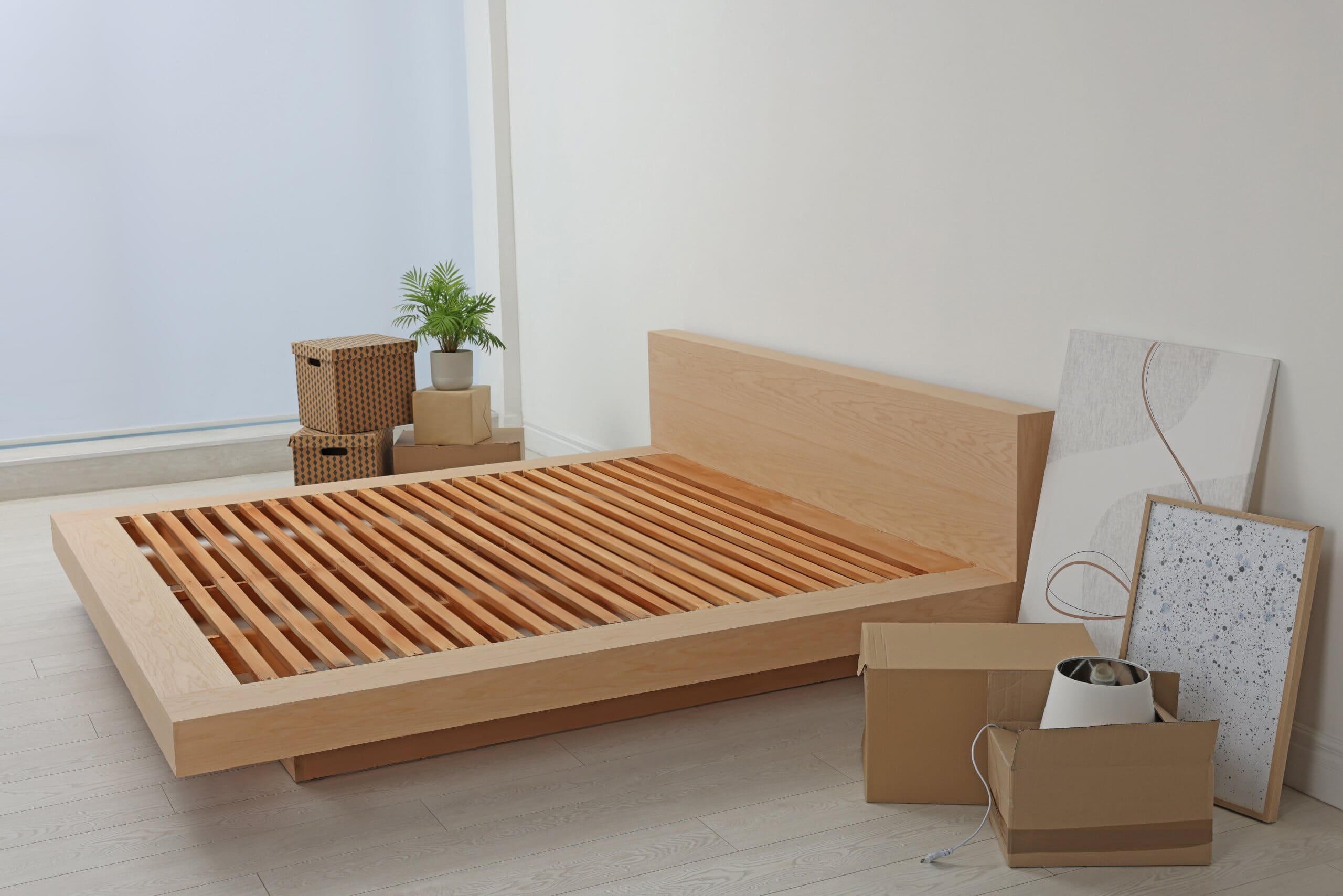Last updated: January 2026
How To Choose A Mattress For A Slatted Bed Frame
Everything you need to know about bed frame slats, including which mattress is best.
Slatted bed frames are one of the most popular types of beds on the market. However, there are so many different models to choose between that finding the perfect design can be tricky.
What is a slatted bed frame?
Slatted bed frames are a type of bed design featuring wooden slats that span from one side of the bed to the other. These slats support your mattress, ensuring a comfortable night’s sleep. They also raise the mattress off of the ground, allowing air to circulate beneath it.
Slatted bed frames come in a wide range of styles and are one of the most diverse types of beds available. They can be fitted with both headboards and footboards and are made from many different materials. Though they are traditionally equipped with legs, some models feature wheels or glides.
Slatted bed frames are an excellent alternative to divan beds. They can be paired with just a mattress, or you can add box springs and bunkie boards to alter the firmness and height of the bed.

Are there different types of slats?
A slatted bed frame will usually come with one of two slat designs - solid slats or sprung slats:
Solid slats
Solid slats, as the name suggests, are rigid wooden slats that are pretty inflexible. They're straight and consist of a single row of slats that sit flat right across the bed frame, and are reinforced with a support bar that runs lengthwise down the centre of the bed frame.
By nature, they're sturdy and strong, and because they're so inflexible, they help to absorb movement. It means that solid kingsize or double bed slats are perfect for those who find they can be disturbed by a partner moving in their sleep, as well as for those who prefer a harder sleeping surface with greater support.



Sprung slats
Sprung slats, on the other hand, are more flexible – they’re often made of woods like beech, rather than pine (which is often used for solid slats because of its rigidity). Beds with sprung slats are laid out in two rows on the bed frame, each one stretching from the edge of the bed to the centre where they’re clipped to a central support rail, normally using plastic clips. With sprung slats for a double bed, for example, each half of the bed will have its own set of slats that run to the centre.
The flexibility of the wood means that there's less chance of the slats cracking or becoming stressed. Normally, you’ll find that sprung slats curve upwards, acting as a shock absorber for your mattress with a feel that’s more springy.
Because each slat is joined to the bed individually, you’ll find that sprung slats offer more flexible support than solid slats, responding to the movement of both the mattress and the weight of your body.
The main difference between the two types of slats is the feel and support they provide. While solid slats are firmer, sprung slats are more cushioned.



How big does the gap need to be between bed slats?
The gap between your bed slats matters more than you may think! Too close together, and you may find that your mattress feels too firm - and you'll also find that air can't circulate as freely between your bed and your mattress.
Too far apart, though, and you risk causing wear and tear to your mattress - as well as running the risk of your mattress feeling lumpy thanks to its lack of support.
Specific mattresses may have their own recommendations when it comes to the optimum distance between slats, so it's always worth checking the small print. However, it's generally recommended that the slats are no more than 7cm apart, and you'll find that there is around 4-5cm between slats with many bed frames on the market.
Why choose a slatted bed frame?
There are several reasons why choosing a slatted bed frame is an excellent choice. These include:
- No need to use a box spring
- Increased airflow to the mattress
- Enables you to adjust the firmness of a mattress
- Excellent weight distribution
- Usually more cost-effective
No need to use a box spring
Slatted bed frames can be used with or without a box spring. A box spring is a platform that contains coiled springs within a wooden frame. However, they still require a mattress on top. By doing away with box springs, slatted bed frames become a cheaper and simpler option. Some people combine slatted bed designs with a box spring platform because they prefer the feel or want to raise the height of their bed.
If you have a memory foam mattress, you should steer clear of box springs, so a slatted bed frame is a much better choice - our guide on The Best Bed Bases For Memory Foam Mattresses will give you more advice.
Increased airflow to the mattress
Mattresses last longer and stay cooler when there’s good airflow to all sides. While people with divans or non-slatted designs can extend the lifespan of their mattress by regularly flipping it, this can be a bit of a fuss. If you find that you regularly sweat during the night, a slatted bed frame can help, as the improved airflow helps heat dissipate from the mattress.
Allows you to adjust the firmness of a mattress
The feel of slatted frames can be altered by adjusting the number of slats and the distance between them. The more coverage you achieve with the slats and the smaller the gaps between them, the firmer your mattress will feel. This isn’t possible with all slatted designs, as many frames feature a limited number of slat slots (the part of the bed into which you fix the slats). This is particularly common with beds that utilise sprung slats.
Excellent weight distribution
Well-designed slatted frames provide excellent support for your mattress. Other designs, such as divans, may offer more equal support across the entire mattress, resulting in a firmer feel, but this isn’t to everyone’s taste. If you prefer a cushioned feel, a slatted bed frame is an excellent choice. It’s also worth remembering that the feel of the bed can be altered by pairing your frame with a softer or firmer mattress.
Usually more cost-effective
In most cases, slatted bed frames are more cost-effective than divans. This is because they’re a simpler design and are available without extra features like additional storage. Prices range from around £90 to £2,500, though bespoke and uber-luxurious models can go for even more.
Disadvantages of slatted bed frames
There are some downsides to slatted bed frames, however. Certain slatted frames are not always suitable for those on the heavier side, as they may not offer the right level of support, and may not be sturdy enough.
Additionally, if not attached properly, bed slats can sometimes move around. This can not only mean that you have a less comfortable night's sleep, but it can also mean that your mattress could get damaged. What's more, slats can sometimes get broken - particularly if you're using a low-quality bed frame, or if the slats are too far apart. This means that you'll have to spend money on replacing individual slats if this is possible - or buying an entirely new bed frame if not.
If you're of a heavier build, or think your bed is likely to get damaged, a divan bed with a reinforced base might suit you better - our Divan Bed Buying Guide can help you choose the right bed frame for you.

What to look out for with slatted bed frames
When it comes to choosing a slatted bed frame there are a few things to look out for:
- Additional slat supports for bigger beds - on wider beds, there should be central support that cuts the length of slats in half. If you see a double, king-size bed or super king-size bed that doesn’t feature a central support, be careful. If long slats are used to span the entire width of a large bed, they’ll be weaker, more flexible and less supportive.
- The distance between slats - the gaps between slats shouldn’t be more than 7cm. If the distance between them is any greater, they’ll struggle to provide adequate support to your mattress. Some designs allow for extra slats to be added to the frame, reducing the size of the gaps.
- Height of the bed - slatted frames are often lower than other bed designs. While this isn’t a problem for most people, you may prefer a higher bed if you struggle with mobility impairments. The height of your frame can be increased by pairing your mattress with a box spring.
What mattress is best for a slatted bed?
Slatted bed frames can be matched with several different types of mattresses. The best mattress for a slatted bed is largely down to personal preference, though there are some important factors to think about:
Spring mattresses
This type of mattress has been in use for around two centuries, though recent innovations have ensured it continues to compete with more modern designs. Spring mattresses feature a layer of coiled springs that are either woven into the design or fitted into individual fabric pockets. While the former is certainly comfortable, the latter is even more so, as all of the springs move independently of one another.
This is the perfect type of mattress for slatted bed frames, as they offer excellent support. They can be used on their own or in conjunction with a box spring.
Memory foam mattresses
Memory foam mattresses were designed by NASA to keep their astronauts comfortable while orbiting the Earth. As you’d expect, they’re pretty special. The mattress is made from a dense foam that moulds to the body, relieving pressure on your body’s contact points. Once you’re up and out of bed, the foam returns to its original shape, so you don’t leave permanent indents.
Memory foam mattresses are ideal for slatted beds. However, it’s a good idea to minimise the space between slats, as memory foam can begin to mould around the slats over time. For more information, you can read our Memory Foam Mattress Buying Guide.
Latex mattresses
Latex mattresses are the design of choice if you suffer from allergies or asthma. The latex layer keeps the mattress free of dust mites and grime, ensuring you get a great night’s sleep. This type of mattress is a little more structured than memory foam, so it doesn’t require quite as much support. However, you may still want to think about reducing the distance between slats or adding extra slats if they’re far apart.
Hybrid mattresses
Hybrid mattresses combine elements from all other types of mattresses. They quite often incorporate memory foam technology, a latex layer or both, as well as pocket springs. They’re an excellent choice for a slatted bed frame.
Can you buy replacement bed slats?
If you break a slat or find that one is starting to come loose, it may be a sign that your bed has come to the end of its lifespan. While you can find replacement slats online for a quick fix, an old bed frame can become dangerous.
Similarly, if you notice a crack or splintering in one of your bed slats, you should remove it right away to prevent further damage or injury. Shards and splinters can cause damage to not only the person sleeping on the bed, but can also tear your mattress. A broken slat can also impact the comfort of your mattress by reducing the amount of support the frame offers. While one compromised slat may not seem like a big deal, it’s surprising how much difference it makes!



To find out if a slatted bed is right for you, check out our guide on choosing between wooden or upholstered beds. You can also find the perfect mattress using our MattressFinder tool, which will match you with a selection of mattresses we think will give you the perfect night’s sleep.

